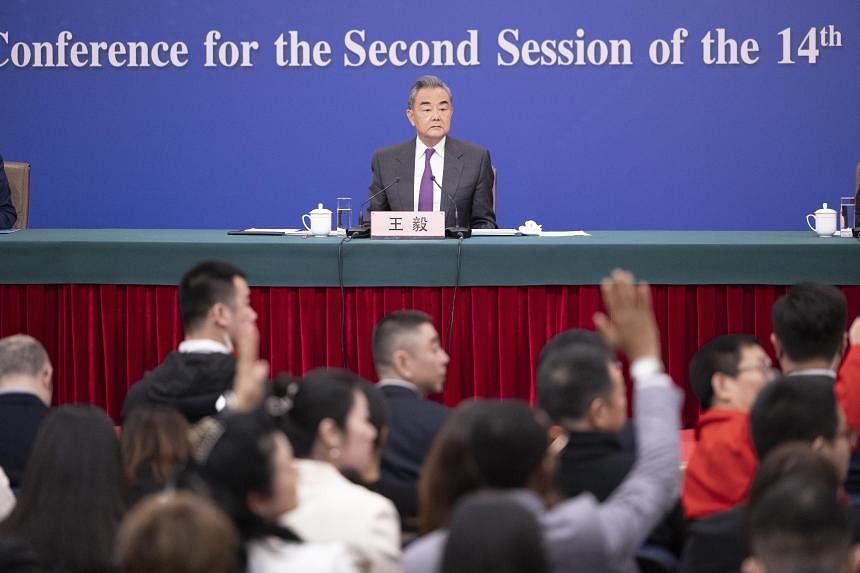BEIJING - After headlining nine successive annual meet-the-press sessions, top diplomat Wang Yi thought he had retired from this much-watched arena in 2023 after handing the baton to the short-lived foreign minister Qin Gang.
Even after Mr Qin got the boot and Mr Wang got his old job back, there was still some anticipation that a new foreign minister – the Communist Party’s international liaison chief Liu Jianchao had the most bets – would be named at the 2024 annual parliamentary session.
But that did not come to pass.
Instead, on March 7, the 70-year-old Mr Wang, who concurrently holds the more powerful position of director of the party’s Foreign Affairs Commission Office – making him his own boss – found himself back in the same hall to face hundreds of journalists again; this time, in what has arguably become the main event at this Two Sessions.
With the premier’s customary wrap-up news conference axed, Mr Wang shoulders the burden of being the most senior bureaucrat to dish out official answers to information-starved journalists with scant access to the country’s top leaders.
And so the media briefing had Mr Wang addressing issues outside the realm of diplomacy, such as artificial intelligence – in which he took the opportunity to promote a strategic global governance plan aimed at shaping international standards – and, for the first time, the state of the Chinese economy.
Saying he was happy to answer the latter question, he took care to naysay the prevailing pessimistic economic outlook, and highlighted President Xi Jinping’s hot new slogan, “new productive forces”, which essentially refers to tech innovation and industrial upgrading.
Emerging industries are booming, “new quality productive forces are taking shape at a faster pace”, he said. China’s supersized market of 1.4 billion people is also “unleashing opportunities for the world”. China’s tariffs have been reduced, a negative list for foreign investment has been shortened, all restrictions on foreign investment in the manufacturing sector have been lifted, he went on.
Yet, such a response coming from a diplomat rather than the prime minister, who is responsible for managing the economy, carries less persuasion and, no doubt, heft.
This makes it even more baffling why the Chinese leadership decided to kill the premier’s news conference.
Some say it is because President Xi does not want Premier Li Qiang, who hosted his maiden meet-the-press session in 2023, to outshine him. But Mr Li was handpicked by Mr Xi for the job.
Others believe it is because the economy is facing its worst crisis in decades, and Beijing would not want to put one of its top leaders, especially a Politburo Standing Committee member, in the hot seat.
That rationale does not convince either, since China’s economy has been in a worse shape before. Even after the Asian financial crisis of 1997 hit China hard, Premier Zhu Rongji, who was appointed the following year and proceeded to reform state-owned enterprises that led to 40 million workers being laid off, carried on with his press conferences which were broadcast live.
In any case, questions at the press conference are screened ahead of time, so the premier does not run the risk of embarrassment.
One could debate over whether the Chinese leaders today have become more thin-skinned. But one thing is for sure: Control over the leadership’s image has reached fever pitch.
Either way, scrapping this annual event – the only opportunity for a top leader to directly engage with foreign and domestic media and to explain Chinese official thinking – runs counter to all that rhetoric about opening up China’s doors wider.
“We can be sure the current leadership does not give two hoots about how the non-event will be perceived internationally,” said Dr James Char of the S. Rajaratnam School of International Studies.
“Still, this is a missed opportunity for Beijing, since Li Qiang might have utilised the conference to dispel lingering doubts outside China about the slowdown in his country’s economy.”
That job, it seems, fell on the foreign minister.
Mr Wang, nicknamed “male god” by the Chinese for his polished demeanour, was not the ideal official to assuage doubts over China’s economic health but was more in his element in delivering signals to the world over the country’s foreign policy.
While he still had tough language for the United States and Taiwan, which journalists have come to expect from these annual airings, the wolf warrior in him appears to have taken a tiny chill pill.
And the overarching message in 2024 remains the same: China is a responsible, generous, peace-loving and benign but growing power that does not discriminate.
The emphasis on the peace-loving part comes across in the liberal use of the word “peace” – Mr Wang mentioned it 35 times during his 90-minute press conference on March 7, compared with 29 times at his last outing in 2022 when he spoke for nearly two hours.
There were the usual representational questions covering each corner of the world, but also others that were blatantly there for the purpose of showing off.
A China Daily reporter, citing a survey the state-owned paper had done in which its readers praised the foreign ministry for evacuating 1,500 Chinese citizens from Sudan in 2023, asked what more Mr Wang’s agency will do for the people.
The diplomat proceeded to tick off the number of consular cases that Chinese embassies around the world handled in 2023, and the growing strength of the Chinese passport. More than 20 countries, including Singapore, Malaysia and Thailand, now have mutual visa-waiver arrangements with China, he said.
“China carries out diplomacy for its people, serving the people. And meeting our compatriots’ expectations is our abiding mission.”
There were also the usual woolly questions such as: “How do you see the prospect of building a community with a shared future for mankind?”, which was posed by another Chinese reporter.
To which, Mr Wang launched into espousing this signature concept that in the past decade has formed the main narrative of China’s foreign policy promoting co-prosperity and equality.
For all his poise and experience, Mr Wang’s returning news conference may have done little to give the hungry fresh meat to chew on, or feed some much-needed confidence in the Chinese economy.


